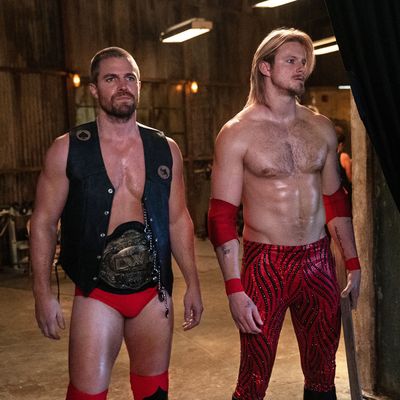
When I sat down with screeners of Heels, the new Starz drama about a small-town wrestling league premiering this Sunday, not until episode two did things click into place about what this show is and what it wants to be. ItÔÇÖs not that the first episode fails to check all the necessary boxes of what a pilot should be ÔÇö it does the boxes efficiently and with a respectable minimum of overobvious expositional stuff. The first episode explains that the show is about two brothers who inherited and star in a local wrestling league, the family business. The older brother, Jack (Stephen Amell), plays a bad-dude wrestling character, a ÔÇ£heel,ÔÇØ the villain everyone likes to boo. Younger brother Ace (Alexander Ludwig) is the ÔÇ£face,ÔÇØ the hero, the triumphant blond smiling one who thrives on crowd approval. That first episode puts all of it into place, and it does an admirable job of setting the scene: the jaded stage manager Willie (Mary McCormack), the economically depressed town in Georgia, the older brother crushed under the weight of responsibility, the younger brother whoÔÇÖs sensitive, frustrated, straining for independence.
Nevertheless, there were three things about my viewing of HeelsÔÇÖ second episode that shifted and clarified my sense of this show. The first was thanks to an oddity of watching TV via screeners. The pilot screener hadnÔÇÖt yet been edited to include the showÔÇÖs opening credits, but they were there in episode two ÔÇö atmospheric, almost amelodic reverberating guitar chords evoking that geographically spacious, emotionally close Friday Night Lights feeling layered over high-filter character portraits and landscape photography that fade into one another with a deliberately sentimental, scrapbook-style aesthetic. Despite the pilotÔÇÖs competence, it would be hard to articulate exactly what tone Heels was aiming for, and those opening credits are a strikingly helpful key. TheyÔÇÖre the opening credits of a show that fully embraces its schmaltz, its schmoopy, sincere, tie-it-to-your-heartstrings Small Towns and Big Feelings genre. ItÔÇÖs a show that knows itself.
HeelsÔÇÖ second episode also makes clear that while the show may know itself, it does not trust its audience to figure that out. Did I mention that Jack and Ace are brothers? They are brothers. They are brothers with some deep, unaddressed issues stemming from childhood, and it causes them to fight with each other, and in wrestling one of them is the Good Guy and one is the Bad Guy but what if in real life itÔÇÖs the opposite and did I mention they are brothers who fight with each other even though they are brothers? Characters continually comment on it, lean into it, just want to make absolutely sure no one misses how tragic it is that they have so much animus toward each other even though ÔÇö play it again, Sam ÔÇö they are brothers!┬á
It is unfortunately something Heels never manages to shake, even after its characters are more established and the overarching plot starts rolling along. Lovely little character beats tend to be followed up by dialogue that lands like an anvil; the script is strewn with giant red arrows that point at subtle emotional complexities to make sure you canÔÇÖt miss them. So much of Heels would be stronger if it had let any of its tender, legitimately messy familial relationships breathe for a few moments without someone immediately leaning over to whisper at you from the sidelines, Hey, did you notice his wife is dissatisfied? Good to pick up on that now because it will come back later!
The final thing HeelsÔÇÖ second episode does solidify, though, is that in spite of the elephantine pressure to overexplain most of its characterization, there are the lovely little beats that arrive first. Jack is a wrestler, but he has a job as a lawn-mower salesman to make ends meet, and episode two includes a scene where Jack puts the hard sell on a potential rider mower customer. He lays out a long, detailed image of fathers and sons, masculinity, responsibility, and making memories with your kids. That scene sells Jack as a storyteller better than anything in the pilot. It drills down on his obsessions, his fantasies, all the stuff he longs for in the abstract but canÔÇÖt make happen in the concrete. Heels is great at set-piece scenes like that. The wrestling sequences are magnetic; all its most showy, theatrical impulses strike exactly the right note. ThereÔÇÖs a later scene in episode two where Jack and Ace end up brawling in a bar ÔÇö with each other, with everyone else, and then against everyone else ÔÇö and itÔÇÖs every bit as captivating as the lawn-mower scene, even though itÔÇÖs also an absurd literalization of its mad-sad muscle-brothers thematics.
Heels would be a better show if it could quit with the hand-holding, if it could stand on the power of its own convictions without needing to fold in a CliffsNotes summary of its every move. And yet Heels can win you over despite the clunkiness. Chris Bauer looks like heÔÇÖs having the time of his life playing a semi-washed-up wrestling star in snakeskin pants and a feather boa. Amell is strong as the brooding Jack. There are promising Rosencrantz and GuildensternÔÇôstyle side characters (James Harrison as Apocalypse and Robby Ramos as Diego Cottonmouth). The racial politics of the wrestling league doesnÔÇÖt get as much attention as it deserves (hard to squeeze in time between every iteration of the ÔÇ£but theyÔÇÖre brothers!ÔÇØ scene), but Heels is at least smart enough to know there is tension there, that it cannot ignore race entirely. ItÔÇÖs ultimately a comfortable, comforting show full of brash spectacle and bro-ey sweetness. Plus, theyÔÇÖre brothers! Did I mention theyÔÇÖre brothers?


